
The House of Babenberg was a noble dynasty of Austrian Dukes and Margraves. Descending from the Popponids and originally from Bamberg in the Duchy of Franconia, the Babenbergs ruled the imperial Margraviate of Austria from its creation in 976 AD until its elevation to a duchy in 1156, and from then until the extinction of the line in 1246, whereafter they were succeeded by the House of Habsburg.

Year 1082 (MLXXXII) was a common year starting on Saturday of the Julian calendar.

Rudolf I was the first King of Germany of the Habsburg dynasty from 1273 until his death.

The Duchy of Carinthia was a duchy located in southern Austria and parts of northern Slovenia. It was separated from the Duchy of Bavaria in 976, and was the first newly created Imperial State after the original German stem duchies.

Ottokar II, the Iron and Golden King, was a member of the Přemyslid dynasty who reigned as King of Bohemia from 1253 until his death in 1278. He also held the titles of Margrave of Moravia from 1247, Duke of Austria from 1251, and Duke of Styria from 1260, as well as Duke of Carinthia and landgrave of Carniola from 1269.

Margaret of Austria, a member of the House of Babenberg, was German queen from 1225 until 1235, by her first marriage with King Henry (VII), and Queen of Bohemia from 1253 to 1260, by her second marriage with King Ottokar II.

Herman VI was Margrave of Baden and titular margrave of Verona from 1243 until his death.
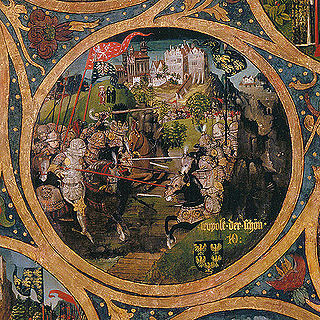
Leopold II, known as Leopold the Fair, a member of the House of Babenberg, was Margrave of Austria from 1075 until his death in 1095. A supporter of the Gregorian Reforms, he was one of the main opponents of the German king Henry IV during the Investiture Controversy.

Ottokar II was Margrave of Styria.
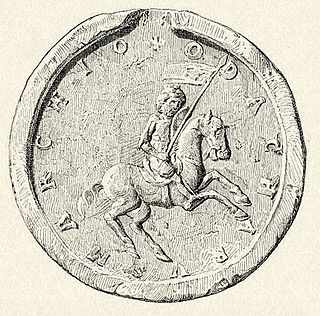
Ottokar IV, a member of the Otakar dynasty, was Margrave of Styria from 1164 and Duke from 1180, when Styria, previously a margraviate subordinated to the stem duchy of Bavaria, was raised to the status of an independent duchy.
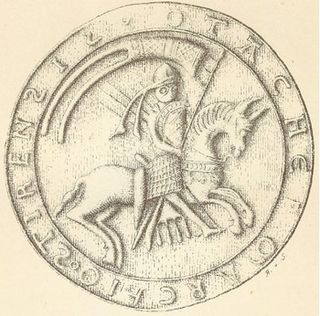
Ottokar III was Margrave of Styria from 1129 until 1164.
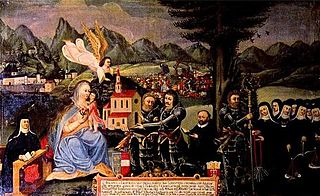
Ottokar I, also Otakar was count in the Bavarian Chiemgau and Margrave of Styria from 1056 until his death. He became progenitor of the dynasty of the Otakars.

The Otakars were a medieval dynasty ruling the Imperial March of Styria from 1056 to 1192.
Ottokar is the medieval German form of the Germanic name Audovacar.
Adalbero of Eppenstein was Duke of Carinthia and Margrave of Verona from 1011 or 1012 until 1035.

The Marchof Carniola was a southeastern state of the Holy Roman Empire in the High Middle Ages, the predecessor of the Duchy of Carniola. It corresponded roughly to the central Carniolan region of present-day Slovenia. At the time of its creation, the march served as a frontier defense against the Kingdoms of Hungary and Croatia.

The March of Styria, originally known as Carantanian march, was a southeastern frontier march of the Holy Roman Empire. It was broken off the larger March of Carinthia, itself a march of the Duchy of Bavaria, around 970 as a buffer zone against the Hungarian invasions. Under the overlordship of the Carinthian dukes from 976 onwards, the territory evolved to be called Styria, so named for the town of Steyr, then the residence of the Otakar margraves. It became an Imperial State in its own right, when the Otakars were elevated to Dukes of Styria in 1180.

The Duchy of Styria was a duchy located in modern-day southern Austria and northern Slovenia. It was a part of the Holy Roman Empire until its dissolution in 1806 and a Cisleithanian crown land of Austria-Hungary until its dissolution in 1918.
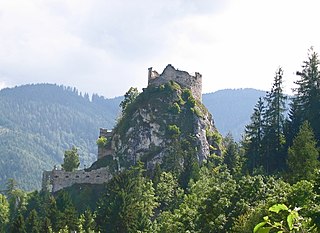
Burgruine Eppenstein is a ruined medieval castle overlooking Eppenstein in the Austrian state of Styria. It was built about 1000 AD as the ancestral seat of the Eppenstein dynasty, whose members served as Margraves of Styria and were enfeoffed with the Duchy of Carinthia in the 11th and 12th century.
This page is based on this
Wikipedia article Text is available under the
CC BY-SA 4.0 license; additional terms may apply.
Images, videos and audio are available under their respective licenses.
















